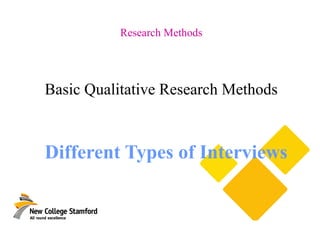
Different types of interview
- 1. Research Methods Basic Qualitative Research Methods Different Types of Interviews
- 2. In today’s lecture • Interviews with different paradigms • Interviews with different levels of flexibility • Interviews conducted by different means • Interviews recorded in different ways • Interviews with different types of interviewees
- 3. What is interviewing • Interviewing is questioning human beings in order to obtain knowledge. • Interviewing is the most widely employed method in qualitative research. • Differences: 1. Philosophical position 2. Flexibility 3. Means 4. Way of recording 5. Type of interviewee 6. Type of data
- 4. Different philosophical positions • Quantitative interviewing: data are gathered through the standardised questionnaire with rigidly structured questions and answers. • Qualitative interviewing: data are gathered through flexible and non-standardised questioning.
- 5. Different levels of flexibility • Structured interview • Unstructured interview • Semi-structured interview
- 6. Questioning techniques At the most basic level your questions will either be open or closed: •Open Ended- a question that does not limit the potential answer that a participant could give and encourages detail. Could you give me your opinion about which method of coaching is the most valuable and suggest reasons for this? •Closed – a question that is presented to a participants that limits potential answers to a list or “yes” or “no”. What is your favourite team in football/rugby/cricket/ netball etc? Other Methods: - Hypothetical. - Multi- Barrelled. - Observational. - Behavioural/Competency Based. - Data Recall. - Reasoning. - Evaluation.
- 7. Structured interview Corbetta (2003) • All respondents are asked the same questions with the same wording and in the same sequence. • Respondents (Interviewees) are free to answer as they wish. • A questionnaire with open-ended questions of a lesser degree of standardization. • Unable to probe as deeply as unstructured interview serves. • Used when the researcher wants to gather data to describe a given social phenomenon quantitatively but knows little about that phenomenon.
- 8. Unstructured interview • Neither the content nor the form of the questions is predetermined. • The interviewer raises the topics, encourages the respondent to elucidate further and leads them back to the main point only if they begin to digress towards subjects irrelevant. • When unforeseen but relevant sub-themes arise during the interview, they will be developed further. • The timing of interview should be determined by the respondent.
- 9. Semi-structured interview • The interviewer normally has a list of questions, which serves as a set of guidelines. • The interviewer decides in which order the various topics are dealt with and the wording of the questions. • The interviewer is free to develop any themes arising during the interview. • Flexibility within a predetermined scheme.
- 10. Interview methodology issues Interviewer effect/bias This concept refers to the possibility that a researcher may influence or distort opinions. Leading Questions •You must be very careful not to elicit a certain response from a participant. For example: I think that the best form of exercise is swimming, would you agree with this?
- 11. Example interview View the following Interview with one of the greatest players ever to play football: Does the researcher use: •Open and Closed questions. •Interviewer bias. •Leading questions. •Lionel Messi.
- 12. Different means • Face-to-face interview • Telephone interview • Online interview • Interview by email/mail
- 13. Face-to-face interview • The best way of conducting qualitative interview. • Unstructured, semi-structured or informal. • Conversation with facial expression and body language. • Taking notes can be difficult. • Transcription can be time-consuming. • The interviewer is able to lead.
- 14. Telephone interview • Unstructured or semi-structured • Conversation without facial expression and body language. • Taking notes can be easier. • Transcription can be time-consuming. • The interviewer is able to lead.
- 15. Online interview • Written conversation • Semi-structured • Time-consuming • Easy and accurate transcription • The interviewer is able to lead.
- 16. Interview by email/mail • Structured • Follow-up questions are often needed. • Easy and accurate transcription • The interviewer is unable to lead.
- 17. Different ways of recording • Notes • Camera • Recorder
- 18. Notes • Taken after but not during informal or unstructured interview. • Often taken during semi-structured interview. • More a means of reminding the interviewer rather than a means of recording data. • Transcription based upon notes may be less accurate. • The interviewer does not need the interviewee’s consent before he takes any notes.
- 19. Camera or recorder • The interviewee’s consent must be gained before a camera or a recorder is used to record the interview. • A lot of respondents do not want what they say to be recorded. • Problem of reactivity. • Transcription could be time-consuming but accurate. • The interviewer may still take notes during or after the interview.
- 20. Different types of interviewees Flick (2006): • Interview with a person: individual interests, biographical account and single case. • Interview with an expert: interests of his or her capacity for a certain field or activity, representing a group of people with specific knowledge or abilities. The interviewer should be familiar with the topics in order to successfully conduct an expert interview. • Interview with focus groups
- 21. Seminar Work Task: Interview two friends in the group. Develop an interview guide/list of questions: Central topic: which Sports club do you support and why? From this: Report your findings. • Step 1: Make a question-list which includes at least 4 questions relevant to the central topic. • Step 2: Verbally question the first interviewee and ask your second to write out their answers to your questions. • Step 3: Explain the differences between the two interviews.
- 22. Required Reading • The textbook: Mason, J. (2002) Qualitative Researching (2nd Ed), London: Sage. • This week’s required reading: Chapter 4
